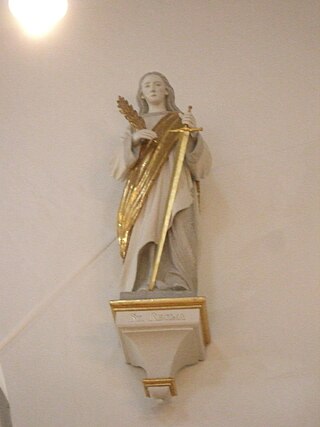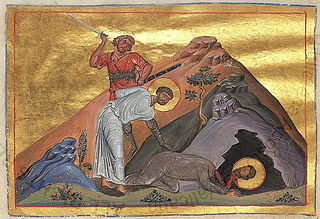
Pope Telesphorus was the bishop of Rome from c. 126 to his death c. 137, during the reigns of Roman Emperors Hadrian and Antoninus Pius. He was of Greek ancestry and born in Terranova da Sibari, Calabria, Italy.

Pope Anacletus, also known as Cletus, was the bishop of Rome, following Peter, and Linus. Anacletus served between c. AD 79 and his death, c. AD 92. Cletus was a Roman who, during his tenure as pope, ordained a number of priests and is traditionally credited with setting up about twenty-five parishes in Rome. Although the precise dates of his pontificate are uncertain, he "...died a martyr, perhaps about 91". Cletus is mentioned in the Roman Canon of the mass; his feast day is April 26.

Pope Zephyrinus was the bishop of Rome from 199 to his death on 20 December 217. He was born in Rome, and succeeded Victor I. Upon his death on 20 December 217, he was succeeded by his principal advisor, Callixtus I. He is known for combating heresies and defending the divinity of Christ.

Saint Valentine was a 3rd-century Roman saint, commemorated in Western Christianity on February 14 and in Eastern Orthodoxy on July 6. From the High Middle Ages, his Saints' Day has been associated with a tradition of courtly love. He is also a patron saint of Terni, epilepsy and beekeepers. Saint Valentine was a clergyman – either a priest or a bishop – in the Roman Empire who ministered to persecuted Christians. He was martyred and his body buried on the Via Flaminia on February 14, which has been observed as the Feast of Saint Valentine since at least the eighth century.

Amphibalus is a venerated early Christian priest said to have converted Saint Alban to Christianity. He occupied a place in British hagiography almost as revered as Alban himself. According to many hagiographical accounts, including those of Gildas, Bede, Geoffrey of Monmouth, and Matthew of Paris, Amphibalus was a Roman Christian fleeing religious persecution under Emperor Diocletian. Amphibalus was offered shelter by Alban in the Roman city of Verulamium, in modern-day England. Alban was so impressed with the priest's faith and teaching that he began to emulate him in worship, and eventually became a Christian himself. When Roman soldiers came to seize Amphibalus, Alban put on Amphibalus' robes and was punished in his place. According to Matthew Paris, after Alban's martyrdom, the Romans eventually caught and martyred Amphibalus as well.

Saint Regina was a virgin martyr and saint of the pre-schism Christian Church. Regina was born in Autun, France, to a pagan named Clement. Her mother died at her birth and her father placed her with a Christian nurse who baptized her. Regina helped out by tending the sheep. She communed with God in prayer and meditated on the lives of the saints. At the age of fifteen, she was betrothed to the proconsul Olybrius, but refused to renounce her faith to marry him, for which she was tortured and was beheaded at Alesia in the diocese of Autun, called Alise-Sainte-Reine after her.

Saint Alban is venerated as the first-recorded British Christian martyr, for which reason he is considered to be the British protomartyr. Along with fellow Saints Julius and Aaron, Alban is one of three named martyrs recorded at an early date from Roman Britain. He is traditionally believed to have been beheaded in Verulamium sometime during the 3rd or 4th century, and his cult has been celebrated there since ancient times.

The Four Crowned Martyrs or Four Holy Crowned Ones were nine individuals who are venerated as martyrs and saints of Early Christianity. The nine saints are divided into two groups:
- Severus, Severian(us), Carpophorus (Carpoforus), Victorinus
- Claudius, Castorius, Symphorian (Simpronian), Nicostratus, and Simplicius

Saints Juventinus and Maximinus were Christian martyrs and members of the imperial guard of Emperor Julian. Their feast day is 25 January.
Julius and Aaron were two Romano-British Christian saints who were martyred around the third century. Along with Saint Alban, they are the only named Christian martyrs from Roman Britain. Most historians place the martyrdom in Caerleon, although other suggestions have placed it in Chester or Leicester. Their feast day was traditionally celebrated on 1 July, but it is now observed together with Alban on 20 June by the Roman Catholic and Anglican Churches.

Susanna of Rome was a Christian martyr of the Diocletianic Persecution. Her existing hagiography, written between about 450 and 500 AD, is of no historical value and the relations it attributes to Susanna are entirely fictitious. It is probable that a real martyr named Susanna lies behind the literary invention.
Marcellus and Apuleius were third- or fourth-century martyrs who were inserted in the General Roman Calendar in the 13th century. They were recognized as saints by the Catholic Church, with 7 October as their feast day. Apuleius is considered purely legendary, and is no longer recognized.
Saints Acheolus and Acius were early Christian martyrs in Gaul. They are associated with Amiens, where Acheolus's name was given to an ancient church, later an abbey.
Wulfsige III was a medieval Bishop of Sherborne and is considered a saint.
Nem Moccu Birn was Abbot of Aran. His feast day is 14 June.

Agoard and Aglibert were martyrs at Créteil, Paris, France, around 400 AD. Other sources say their martyrdom was in the 7th or 8th century. Saint Agoard and Saint Aglibert are celebrated locally on 24 June.

The Martyrs of Persia under Shapur II were Assyrian Christian martyrs who were put to death by Shapur II of Persia for failing to renounce their faith. There may have been several thousand in total. They are remembered as a group in the Roman and Orthodox calendars. The Roman Martyrology gives feast days of 6 April, 22 April and 9 May for different groups.
Saint Ischyrion was an Egyptian officer in the Roman army who was martyred in Alexandria during the persecution of the Emperor Decius . His feast day is 22 December
The Martyrs of Alexandria under Decius were a number of Christians who were martyred in Alexandria, Egypt, under the Roman Emperor Decius . Their feast day is 30 October.
Saint Augulus was a 3rd or 4th century bishop and martyr in a town called Augusta in Britain, or perhaps in Normandy. He was possibly Irish in origin. Little is known about him, but his feast day is given as 7 February.
 This article incorporates text from this source, which is in the public domain .
This article incorporates text from this source, which is in the public domain .










